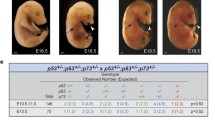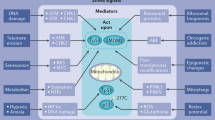Abstract.
In addition to its role as a tumour suppressor and cell-cycle checkpoint control protein, p53 has been implicated as an important protein in embryonic development. Despite the viability of most p53 null mice, evidence has accumulated that p53 may regulate differentiation and the response of embryonic cells to diverse environmental stresses. Moreover, it appears that maintenance of a fine balance of p53 protein levels within embryonic cells is important for optimal development. Inappropriate overexpression or underexpression of p53 can lead to embryonic lethality or increased risk of malformations. The p53 protein may utilize multiple functional activities in its regulation of developmental processes.
Similar content being viewed by others
Author information
Authors and Affiliations
Rights and permissions
About this article
Cite this article
Choi, J., Donehower, L. p53 in embryonic development: maintaining a fine balance. CMLS, Cell. Mol. Life Sci. 55, 38–47 (1999). https://doi.org/10.1007/s000180050268
Published:
Issue Date:
DOI: https://doi.org/10.1007/s000180050268




